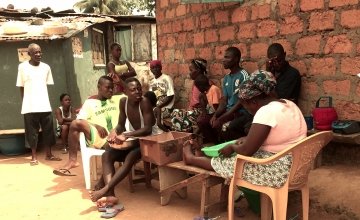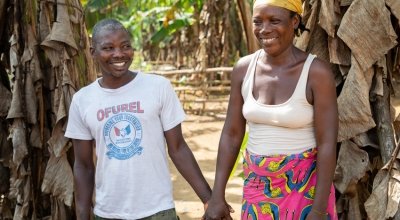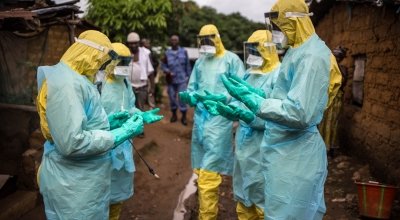
Read our 2023 annual report

Knowledge Hub
Ebola crisis reaches new heights in Liberia and Sierra Leone

As the death toll from Ebola escalates rapidly in the two worst affected countries of Liberia and Sierra Leone, Concern Worldwide continues its on-the-ground response.
Increasing rapidly
The WHO have said that “non-conventional interventions” are needed in Liberia to curb the spread of Ebola.
The number of cases is increasing rapidly and the government and charities do not have sufficient capacity to respond.
This comes as 14 out of 15 of Liberia’s counties are now reporting confirmed cases.
Rumours and misconceptions
Concern's Country Director for Sierra Leone, Fiona McLysaght, wrote about the situation in this piece for the Irish Examiner.
She explains: 'Much of the reporting around ebola is rife with rumours and misconceptions. In my experience, there seem to be three main popular misconceptions around the viral outbreak.
'The first is that it is easy to contract Ebola. Due to the gruesome nature in which the virus manifests itself in humans, people are understandably terrified of contracting Ebola. Anecdotes abound about how people are scared of being on an airplane in the same confined space as anyone travelling from West Africa.
'However, Ebola is not airborne and cannot be contracted by simply sitting beside someone and breathing the same air. Concern Worldwide have dedicated staff on the ground in both Sierra Leone and Liberia, none of whom have contracted the virus or come even close.
'This is because the people most at risk of contracting the virus are those working in frontline health (doctors, nurses) and family members caring for patients. Patients are not contagious until they are visibly ill. The virus is transmitted through bodily fluids so most people are not at risk and barrier nursing is sufficient to protect oneself.
'The second misconception is that Ebola is a death sentence. The WHO states that: “Ebola virus disease outbreaks have a case fatality of up to 90%”.
However, the fatality rates in the current outbreak are significantly lower than this, at just over 50%.
'The third misconception is that international airports need to be shut down to stop the outbreak reaching Europe. No one wants an Ebola outbreak similar to that in Sierra Leone to occur in Ireland.
'But we must be aware that the virus has only been able to spread so far and wide in West Africa due to poor health infrastructure and the inability of poorer nations to respond quickly and effectively. If the virus was ever to reach Irish shores, we have a health system which could isolate and contain cases to stop it spreading further.'
Humanitarian emergency
Several aid agencies working on the ground have spoken out against the inaction of the international community to intervene in the crisis.
They argue that a global outbreak can only be curtailed by providing trained staff and the necessary supplies in the field.
Broken healthcare system
Due to gross inadequacies of the healthcare systems in Sierra Leone and Liberia, destroyed after decades of civil war, a new crisis within the Ebola emergency has emerged.
Many of the basic health centres that do exist are now shutting down.
This is due to a lack of sufficiently equipped staff who feel unprotected from the virus and are too fearful to go to work.
The travel bans into the affected countries and into other parts of Africa have come under intense criticism by medical experts.
Certain airlines suspended flights in countries like Kenya, located 5,000 kilometres from the Ebola zone with no suspected cases of the virus.
By refusing entry to international specialists into affected countries, they say, efforts to stem the spread of the disease will be effected.
Meanwhile, the World Health Organisation reports that the death toll in west Africa continues to rise, with 1,841 reported deaths and 3,685 suspected cases as of 31 August.
Raids in Liberia
Last month, in the densely populated urban slum of West Point in Liberia’s capital of Monrovia, residents forced their way into a health centre, accusing the government of moving in affected patients to spread the disease.
Reportedly, 17 suspected sufferers were taken away by their families.
Blood-stained mattresses, bedding and medical equipment were looted, police said, posing a health hazard in the community.
Curfews and quarantines
In response, Liberia’s President Ellen Johnson Sirleaf introduced a nationwide night-time curfew with specific quarantines for West Point and Dolo Town – another urban slum in the capital. She did not say how long the quarantines would last, but that they were necessary to offset further contagion.





